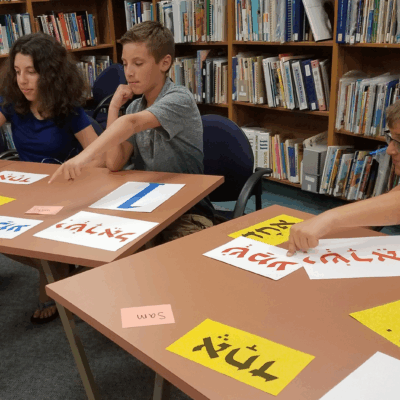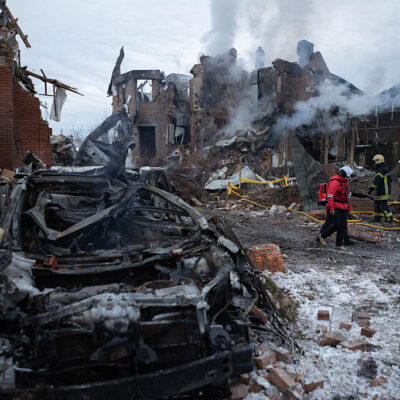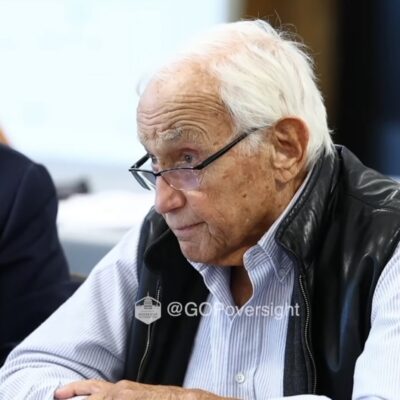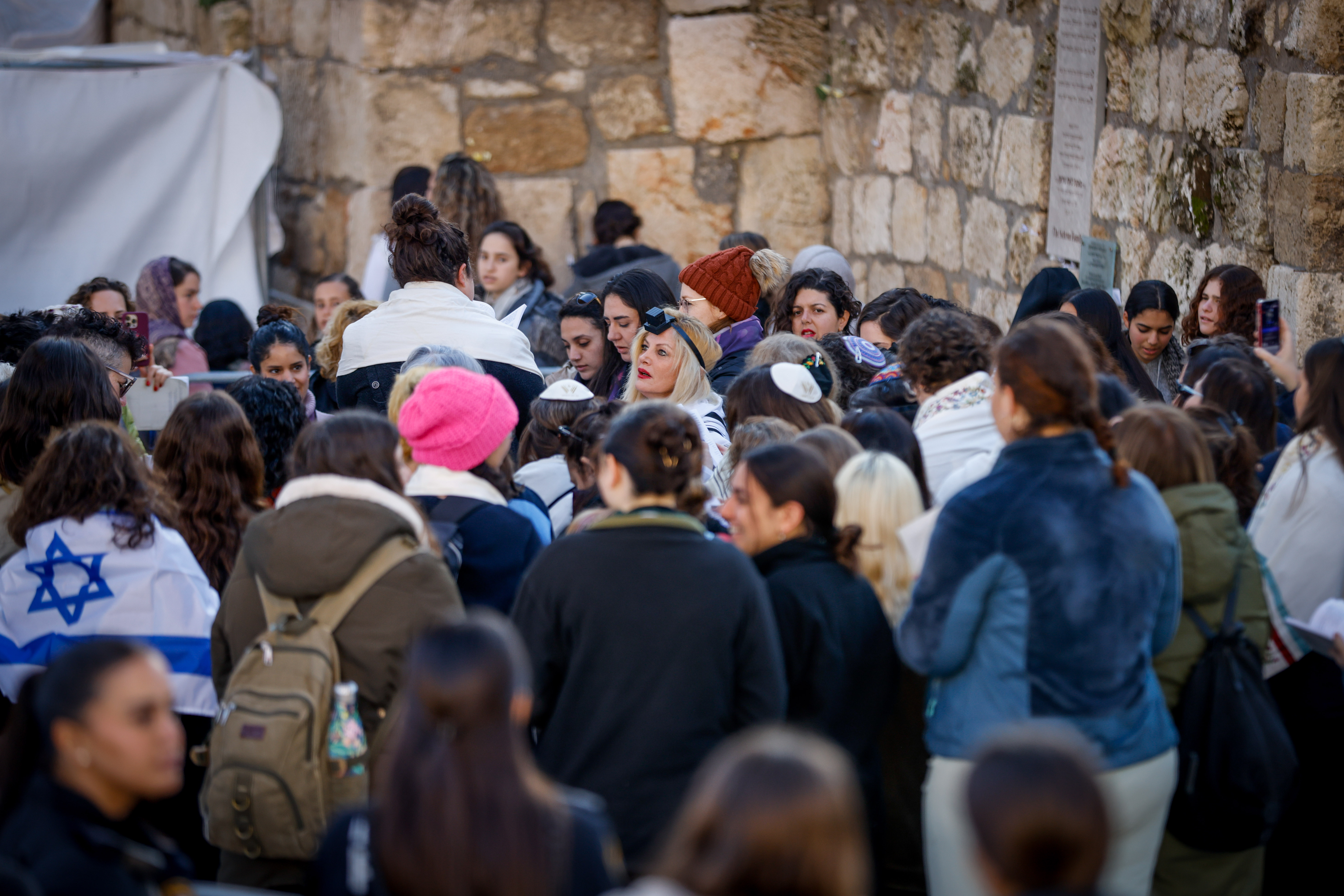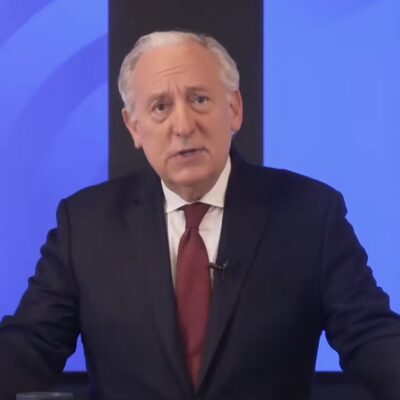Your Daily Phil: Grappling with a conflicted Sukkot and Simchat Torah
Good Wednesday morning.
Ed note: In observance of the Sukkot holiday, which begins this evening, the next edition of Your Daily Phil will arrive on Monday, Oct. 28. Chag sameach!
In today’s edition of Your Daily Phil, we report on a rapid effort by a London synagogue to dedicate a new Torah scroll in honor of the victims of the Oct. 7 attacks before Simchat Torah and on a donation to create an institute to train Jewish choir conductors. We feature an opinion piece by Jodie Goldberg about how to make your sukkah more meaningful, another by Erica Brown on what the Book of Ecclesiastes can teach us this year in particular and one by Rabbi Avi Killip on balancing the desire to mourn and to celebrate this Simchat Torah. We’ll start with a new study on the mental health challenges facing residents of Israel’s Western Negev.
Residents of the Western Negev face dire mental health challenges one year after the Oct. 7 terror attacks and start of the war in Gaza, due to the ongoing conflict and — an even greater extent — the country’s own political turmoil, according to a new study released on Monday, reports eJewishPhilanthropy’s Judith Sudilovsky.
The Negev Residents’ Resilience Index revealed widespread feelings of insecurity and mental health struggles for residents of the Western Negev in the aftermath of the Oct. 7 Hamas attack. The report indicates that more than half of the area’s residents perceive their living conditions as dangerous, with approximately 60% reporting high to moderate symptoms of stress and anxiety and about 50% of the residents in the Jewish localities exhibiting moderate or high levels of post-traumatic stress disorder.
It found that the domestic political turmoil and the threat of violence in Israeli society were perceived by all residents of the Western Negev as even more threatening than the threats of war that the country is facing on all fronts, researcher professor Bruria Adini, head of the emergency & disaster management department at Tel Aviv University, told eJP.
The study was conducted by New Land Now, a nonprofit formed after Oct. 7 dedicated to the strategic revival of the Western Negev, in collaboration with researchers from Tel Aviv University and Tel Hai College, as well as Indicate, a strategic consulting and digital communication company. It is the most thorough examination of the local population’s emotional state since the onset of the conflict.
The report, the second released by the group so far, was created to assess the psychological resilience of the local population and evaluate the ongoing war’s impact on southern residents, said David Gabbay, chairman of New Land Now and a survivor of Oct. 7 from Kibbutz Re’im where he was a member of the emergency response team. He was evacuated first to Eilat and then to an apartment complex in Tel Aviv with his family and community where he is still living today.
Results point to the need of equipping relevant authorities with data-driven tools to develop effective measures tailored to the specific needs of each Western Negev community individually, the researchers concluded in the report. “The policymakers need to look at the numbers and see the diversity among the different communities in order to design the interventions,” Adini said. “It’s not one suit fits all…and you need to have civic engagement as part of anything you plan.”
The report will be used as a baseline study for the Western Negev population and is part of ongoing analysis of the general population in Israel, which includes five previous studies since the start of the war, she said.
One element that has impacted the level of resilience and governmental trust especially in the kibbutzim and moshavim and in the Bedouin community is the issue of the hostages remaining in Gaza, said Adini. “The fact that they feel that not enough is being done [to bring the hostages home]—that there is a conflict of interest—impacts on their [resilience level], on their level of trust,” she said. “The hostages are from the kibbutzim and some of the Bedouin [communities.] For them, it’s very personal…they are directly impacted.”
Western Negev residents also expressed dissatisfaction with the level of mental health treatments available in the region, which for some is a deciding factor in their choice to return to the area, said Gabbay. “People don’t want to go back or have difficulties coming back to their homes because they feel that the treatments they will receive at the mental health level will not be high-level,” he said.
In light of this, New Land Now is planning the creation of a healing village on 33 acres in Kibbutz Sa’ad, which will provide both traditional and alternative therapeutic treatments for the area residents, he said. They will be receiving some funding from the government but are also looking for philanthropic partners who will help them raise matching funds to reach the $12 million budget goal needed for the facility, Gabbay said.
The researchers hope to issue four resilience reports each year and make them available to relevant authorities and organizations such as local communities, government ministries or philanthropic groups and individuals who want tobetter understand the process the region is undergoing in terms of economic indicators, relevant social issues and mental health needs, and the impact of interventions and projects being implemented.This will enable them to more wisely invest resources and funding, and create the appropriate programs which will help more efficiently in the rehabilitation of the area and avoid duplication of projects, Gabbay said.
“First, let them understand what’s going on, understand what the situation is, understand what the processes are,” he said. “Let them understand data and then accordingly [they will be much wiser when] they come and contribute their part to the rehabilitation framework because everything will be based on numbers and data and insights.”
IN THEIR MEMORY
To mark Simchat Torah in shadow of Oct. 7 anniversary, London Chabad dedicates new Torah scroll to victims

On the Shabbat before Rosh Hashanah, Rabbi Yossi Simon, the leader of London’s Chabad of Golders Green was discussing with members of the the community the final commandment in the Bible — the requirement to write your own Torah scroll — as well as how they would commemorate the Oct. 7 terror attacks, which fell on Simchat Torah in Israel. Suddenly, the two ideas came together: The community would write its own Torah scroll, sponsored by the members, which would be dedicated to all of those who were killed on Oct. 7 and would be used in this year’s Simchat Torah celebrations, which were less than a month away, reports Jenni Frazer for eJewishPhilanthropy from London. Despite the tight time schedule, yesterday, the community marked the completion of the scroll, along with the dedication of a cover and silver crown.
Get it done: A sofer stam (scribe) was found in Israel who had almost finished writing a scroll and was just having it scrutinized for potential errors. He agreed to sell it to the community. And a massive operation kicked off to raise the money by “selling” each of the Torah’s 54 parshas for £1,200 ($1,558). Yesterday, a bulky parcel arrived from Israel at London’s Heathrow Airport, swathed in packaging and only just identifiable as a Torah scroll by the wooden poles visible through the wrapping. The scroll was ready, save for the verse of the Torah, which was completed last night with a local scribe on behalf of members of the community.
In his name: Among those present to complete the scroll was Shai Shojat, whose uncle, Michel Nisenbaum, from Brazil, was among those murdered on Oct. 7. Michel, 59, was killed in the southern town of Sderot, and his body was taken into Gaza and only retrieved by the army on May 24. Shojat, who attended the ceremony with his young children, entered a letter in the sefer Torah in his uncle’s name.
MUSIC, MAESTRO, PLEASE
Zamir Choral Foundation receives $500,000 gift to train Jewish choir conductors

Cantor Robert Lieberman and his wife, Rabbi Vicki Lieberman, donated $500,000 to the Zamir Choral Foundation, a nonprofit focused on promoting Jewish choral music, in order to create a first-of-its-kind institute to train conductors of Jewish choirs, the organization told eJewishPhilanthropy’s Judah Ari Gross.
Creating a pipeline: The Jewish Choral Conducting Institute, which will have its first meeting on Sunday, will train a cohort of 12-15 Lazar Fellows, named in honor of the founder and director of the foundation, Matthew Lazar. The participants come from the United States and Israel and will take part in “in-person retreats and workshops, monthly online and in one-on-one mentoring sessions with Maestro Lazar and guest presenters,” the organization said. Upon completion of the program, they will receive a certificate in Jewish choral conducting, as well as assistance finding places to work afterward.
Secured and expanded: “By auditioning and training the next generation of conductors, under the leadership of Maestro Lazar, the future of Jewish choral music and its impact on Jewish literacy into the next generation will not only be secured but expanded throughout the United States and Israel,” Robert Lieberman said in a statement.
MAKING MEANING
Designing with intention: The sukkah as a relational sanctuary

“Over the past few years, our ability to be seen and see others, allow for our perspectives to be heard and opinions to be valued have been overshadowed by our collective grief. Sukkot represents our profound opportunity within the Jewish calendar to reclaim what it means to proactively gather in order to reconnect with ourselves and each other in ways that allow us to help others feel more seen and understood,” writes Jodie Goldberg, founder and principal of Fleurish Consulting Inc., in an opinion piece for eJewishPhilanthropy.
Lessons from the ‘Four Species’: “The backbone of Sukkot is the opportunity to dwell with family and friends in the sukkah… While designing a sukkah, we have an opportunity to utilize its internal walls to create invitations in the form of photos, interactive art work, banners and symbols in order to spark curiosity that can lead to deeper connections between people.”
Coming together: “Jewish tradition teaches us that it’s a mitzvah to share a meal with others in the sukkah… Reframing the meal through the lens of a potluck allows sukkah guests to bring a food item or dish that tells a story about who they are and ignites curiosity in others to learn more about the person they want to become… Judaism offers us profound gifts in the form of prayer and song which help ground us in our own emotions and narratives.”
TIME IS NOW
The pages of Ecclesiastes are now the pages of our lives

“About this time a few years ago… I went to visit a friend in the hospital who was very ill… The problem was that her next of kin was not answering the phone. A few hours later, I finally got hold of him. He told me not to worry. I would see her in the next few days. But my dear friend, to everyone’s surprise, died that evening. I was unable to see her for the last time and say goodbye,” writes Erica Brown, the author of Kohelet and the Search for Meaning and vice provost for leadership and values at Yeshiva University, in an opinion piece for eJewishPhilanthropy. “This dose of deep regret helped me appreciate the advice that the Israel Defense Forces gives soldiers before entering combat: Say goodbye. Don’t wait. First write letters to loved ones with the hopes that no one will have to read them. Ever.”
Enjoy while you can: “I’ve been thinking about [that] a great deal as we transition from Yom Kippur to Sukkot, when we traditionally read Kohelet, the Book of Ecclesiastes. Kohelet expresses great uncertainty about the world and accentuates the looming shadow of death. Be prepared, its author assumes, for any eventuality, and make every moment count more. In seven verse clusters throughout the book, Kohelet promotes the small joys of eating and drinking with friends amidst the grander, more difficult of life’s challenges. This, too, is a response to the fragility of life. Say the right words and grab the temporal pleasures because they may be all you have.”
Make it count: “This Sukkot, as we recite Ushpizin to welcome in heroes from our biblical past, let us include heroes and hostages from our recent past. And let us create authentically intimate spaces – physically and emotionally — where we are not afraid to tell our friends and family what they mean to us and how much we love them under the shelter of a ceiling that still exposes a little bit of heaven. Because we are alive and because we can.”
TIME TO GRIEVE, TIME TO DANCE
Cries of sadness and shouts of joy

“A neighbor invited me to her annual Simchat Torah potluck picnic lunch. Her email invited us to be together again this year, so that “the kids can celebrate, while the adults cry.” I have heard this same refrain from everyone as the holiday approaches — the children need space to joyfully celebrate the Torah with candy and dancing, while adults can’t imagine feeling anything but grief on the anniversary of a massacre. How can we give our children Simchat Torah when the adults need Tisha B’Av?” writes Rabbi Avi Killip, executive vice president at the Hadar Institute, in an opinion piece for eJewishPhilanthropy.
Weeping and shouting: “There is an emotional passage from the book of Ezra that recounts the moment of the rebuilding of the Temple. We might imagine this as a purely ecstatic and joyous experience for the Jewish people, but Ezra presents a more nuanced picture: One where the elders and the youth seem to have entirely different experiences simultaneously… ‘The elders who had seen the first house, wept loudly at the sight of the founding of this house. Many others shouted joyously at the top of their voices.’”
This year can hurt: “[Rashi] teaches that the weeping actually overtook the sounds of joy and that the sound of the tears was heard far beyond that of the rejoicing… When I am honest, I must admit that Rashi’s reading sounds more appropriate for this year. This first year, we can and probably should let our weeping overtake the sounds of the joy of the children. That is appropriate. This year we need to allow the tears to flow… Over time, perhaps the sound of the weeping will recede and we will again find the ability to shout together for joy.”
Worthy Reads
Often Overlooked: In The Chronicle of Philanthropy, Richie Siegel, the president of the disability-focused Inevitable Foundation, argues for the nonprofit sector to consider disability inclusiveness at all levels of its work. “Disability was not historically a priority for philanthropy, so it was rarely part of foundations’ original strategic plans. And since it wasn’t a priority at the beginning, many funders now consider it too challenging to incorporate without compromising their existing grantees.This catch-22 shows up in the data. Just one penny of every 10 grant-making dollars in the United States goes to disability rights and social justice, according to a 2023 report by the Disability & Philanthropy Forum… Grant makers often tell me that disability is not part of their strategy. My response to them: If your work focuses on improving the lives of people on this planet — the stated purpose for most funders — then disabled people are part of your strategy. You just haven’t made room for them yet.” [ChronicleofPhilanthropy]
Brave New World: In Bloomberg, Tyler Cowen considers how philanthropy can use artificial intelligence for good.“In an age of accelerating progress in artificial intelligence, everyone is debating AI’s implications for the labor market or national security. There is far less discussion of what AI could or should mean for philanthropy… One big change is that AI will enable individuals, or very small groups, to run large projects. By directing AIs, they will be able to create entire think tanks, research centers or businesses. The productivity of small groups of people who are very good at directing AIs will go up by an order of magnitude. Philanthropists ought to consider giving more support to such people. Of course that is difficult, because right now there are no simple or obvious ways to measure those skills. But that is precisely why philanthropy might play a useful role… Then there is the matter of AI systems themselves. Philanthropy should buy good or better AI systems for people, schools and other institutions in very poor countries. A decent AI in a school or municipal office in, say, Kenya, can serve as translator, question-answerer, lawyer, and sometimes medical diagnostician.” [Bloomberg]
Word on the Street
The Treasury Department designated the anti-Israel group Samidoun a “sham charity,” acting as a key international fundraiser for the Popular Front for the Liberation of Palestine terrorist group…
The Jewish Federation of Southern New Jersey and the Jewish Federation of Princeton Mercer Bucks established an alliance for shared programming and resources, effective Oct. 1…
Renee Kutner was selected as the next CEO of the Jewish Federation of Greater Atlanta, the first woman to hold the position. She has served as COO since 2021 and will replace longtime leader Eric Robbins on Dec. 1…
Idit Klein will be stepping down as president and CEO of Keshet, the leading organization working for LGBTQ+ equality in Jewish life in the United States, after 24 years at the helm effective July 31, 2025…
The Chronicle of Philanthropy looks at how philanthropists are rethinking their disaster response strategies in the face of the increasing frequency and severity of extreme weather events…
Former Anti-Defamation League National Director Abe Foxman endorsed Vice President Kamala Harris for president in a Times of Israel column…
New England Patriots owner Robert Kraft shared in a “The Breakfast Club” interview on Friday that he distanced himself from then-President Donald Trump, whom he considered a personal friend, after the Jan. 6 Capitol riot…
Dr. Miriam Adelson has contributed $100 million to her super PAC to elect Trump, making her the largest individual donor to a presidential super PAC this cycle…
The German airline Lufthansa was fined $4 million by the U.S. Department of Transportation over allegations it discriminated against a group of Jewish passengers…
Dr. Yoel Leviev, 24, the grandson of business magnate and philanthropist Lev Leviev, was killed in a car accident on Monday while riding an electric bike in Yehud, Israel, months after graduating medical school…
Prominent Las Vegas philanthropist Joyce Mack died on Friday at 99; together with her late husband, Jerry Mack, the two were long involved in the Las Vegas Jewish community and established the Bank of Las Vegas and helped establish what later became the University of Las Vegas…
Pic of the Day

Jemi Goldstein holds the Sid Jacobson JCC’s Tikkun Olam Award last Wednesday at a luncheon to raise money for the Long Island organization’s adult day programs.
Mother-daughter pair Rita Levy and Rebecca Levy were also honored at the event for their philanthropic work, and actress Marisa Tomei spoke at the event, which raised $400,000 for the programs that support people with dementia and other neurodegenerative disorders.
Birthdays

Retired basketball player for the Seattle Storm of the Women’s National Basketball Association, she has five Olympic gold medals, Sue Bird…
Israeli attorney, chairman of Maccabi Tel Aviv Basketball, Shimon Mizrahi… Retired CFO of Amtrak, Midway Airlines and Airlines Reporting Corporation, Alfred Samuel Altschul… National president of the Zionist Organization of America, Morton A. Klein… Film director, producer, screenwriter and creator of “The Naked Gun” franchise, David Zucker… Professor of economics at Smith College and author of 24 books, Andrew S. Zimbalist… Director of strategy in the policy and government affairs department at AIPAC, Marvin C. Feuer… Novelist, short story writer and essayist, Elinor Lipman… Executive director of Clark University Hillel, Jeff Narod… Member of the Massachusetts House of Representatives since 1999, David Linsky… Bestselling French novelist, one of whose books was made into Steven Spielberg’s “Just like Heaven,” Marc Levy… President of the American Academy in Berlin, he was the coordinator for counterterrorism during the Obama administration, Daniel Benjamin… Otolaryngologist who also specializes in facial and reconstructive surgery, he is married to Ashley Biden, the daughter of President Biden, Howard David Krein, M.D…. Senior partner at Battery Ventures Israel’s office, Scott Tobin… Attorney in Port St. Lucie, Fla., he served in the Florida House of Representatives, Adam M. Fetterman… Actress Kala Lynne Savage… Founder and CEO at Social Studies, Inc., Brandon Jared Perlman… Four-time U.S. Army light-middleweight boxing champion, he boxed with a Star of David on his trunks, Boyd “Rainmaker” Melson… Product management lead at The Washington Post, Jason Langsner… West Coast regional director at Foundation for Jewish Camp, Margalit C. Rosenthal… Deputy director of operations at NYC Health + Hospitals, Avi Fink… Senior director of communications at Mark43, Devora Kaye… Business analyst at LWF Group, Sam Ginsberg…


 Add EJP on Google
Add EJP on Google

